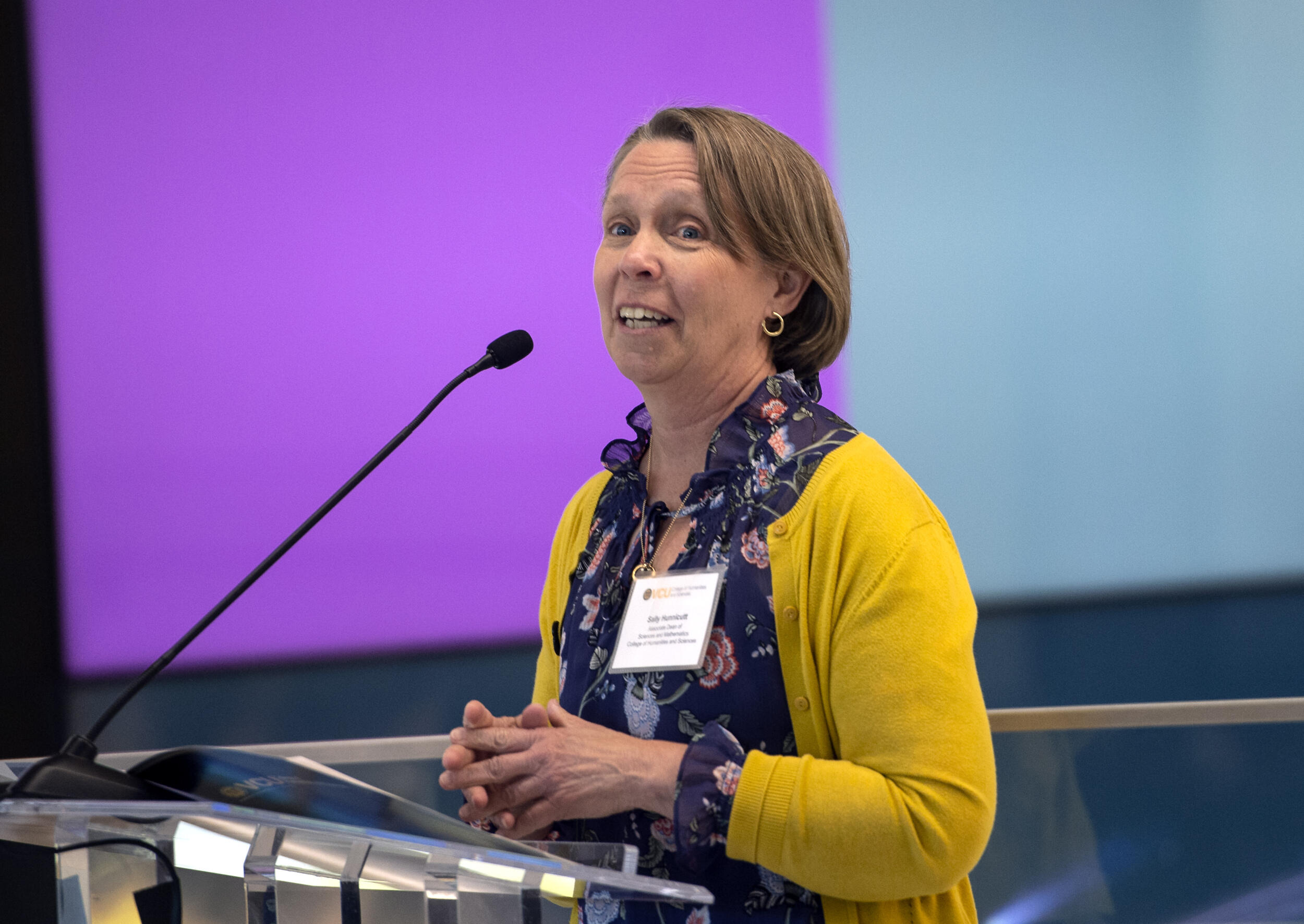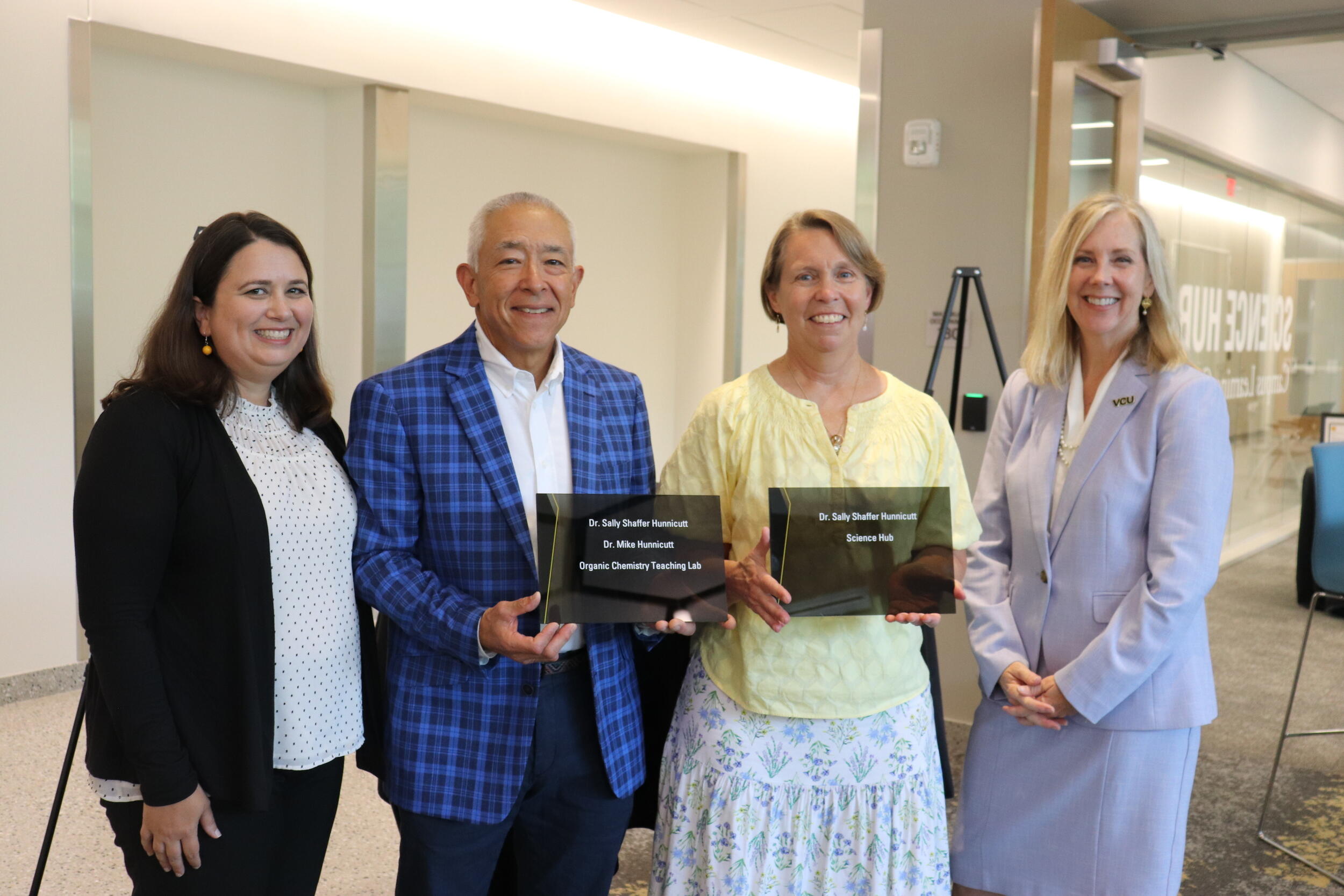
Feb. 10, 2025
Sally Hunnicutt retires after a career teaching students ‘how scientists see the world’
Share this story
Sally Hunnicutt’s career at Virginia Commonwealth University reflects her belief that to be a good teacher you must love both the students and the subject.
“For me, I get a lot more out of teaching when I am interacting with the students,” Hunnicutt said. “You can find diamonds in the rough,”
Hunnicutt retired in 2024 after 26 years at VCU. At the time of her retirement, she served as professor of chemistry and associate dean for faculty and academic affairs in sciences and mathematics in the College of Humanities and Sciences.
As a teacher, Hunnicutt made a difference in the lives of many students by bringing to the science classroom innovative techniques for student learning such as POGIL (Process Oriented Guided Inquiry Learning). This method of learning puts an emphasis on professional skills and teamwork along with critical timing and problem-solving life skills.
“With POGIL, you treat students like they are scientists — you teach students how scientists see the world,” Hunnicutt said. “I restructured my classes. Instead of giving a lecture, I had students working in teams of three or four where there was much more give and take. I got better results, and I became a better teacher.”
She found she was more in tune with what students did and didn’t understand during classes.
“The students got a lot out of it,” she said. “They got to know each other and work with different people. The diversity and interacting with one another helped them navigate the world.”
Catherine Ingrassia, Ph.D., dean of the College of Humanities and Sciences, recognized Hunnicutt’s commitment to individual student success and how she worked to advance that goal as a teacher and as an administrator.
“She always asked the good questions about how a change or policy or action would affect students,” Ingrassia said. “She did the same thing with all faculty, but she was particularly attentive to the unique demands upon our teaching term faculty.”
In 2012, Hunnicutt earned the VCU College of Humanities and Sciences Teaching Award for her excellence in the classroom. Then, in 2014, she received the university’s Distinguished Teaching Award.
Cultivating a childhood passion
Her interest in teaching started in her youth during pretend play sessions where she assumed the role of teacher. By the time she was in high school, she discovered a second love — chemistry.
“I’ve always been drawn to chemistry and teaching,” she said. “Looking back, I can definitely see that thread through the choices I’ve made. I loved chemistry because it combined the magic of seeing what happens when reactants are mixed with the precision of math and modeling at the atomic level to understand what happened or even predict what will happen.”
After growing up in a northeast suburb of Philadelphia, Hunnicutt headed to Duke University to get her bachelor’s degree in chemistry and science education. She received her master’s from the University of Utah and her doctorate in chemistry from the University of Cincinnati.
After teaching at the University of Dayton, she and her family moved to Richmond in 1997. A year later, she accepted a job at VCU.
“I love my colleagues at VCU. I also like that there are lots of opportunities,” she said. “I love the resilience and determination of the students.”
At VCU, Hunnicutt had the opportunity to work with her husband for 12 years, and he saw his wife’s passion for teaching play out in the classroom. Through a donation in 2023, Michael Hunnicutt, Ph.D., a retired associate professor from the Department of Chemistry, arranged to name two spaces in the new STEM Building in his wife’s honor – the Science Hub, a dedicated space for science and math tutoring, and an organic chemistry lab.
Hunnicutt was stunned.
“The new STEM laboratory building is something I had been involved with as a faculty member. It was an exciting opportunity,” she said. “My husband is extremely generous and wanted to recognize my efforts and surprise me. To have that as a legacy is humbling and overwhelming.”

The Science Hub is now known as the Dr. Sally Shaffer Hunnicutt Science Hub and the organic chemistry lab in room 507 is the Dr. Sally Shaffer Hunnicutt and Dr. Mike Hunnicutt Organic Chemistry Teaching Lab. Their donations for the new building are consistent with their commitment to supporting VCU and its students; in 2013 they endowed the Distinguished Chemist Scholarship.
In a speech at the dedication, Michael Hunnicutt referred to his wife as a “servant-leader.”
“It’s all about creating that positive momentum in a student’s life that can change their life trajectory,” he said, referring to his wife and the CHS faculty and staff.
During her time at VCU, Hunnicutt always advocated for transformative learning and innovative teaching methods.
“Her role in the conception and development of the STEM Building cannot be overstated. She has been instrumental in shaping the design of the new learning environments,” said Ingrassia, who describes Hunnicutt as “thoughtful and considerate. She takes the work seriously but doesn't take herself too seriously which always made her a joy to work with.”
Looking forward to the future
Hunnicutt credits her mentors, including Ingrassia and Jennifer Malat, Ph.D., former dean of the College of Humanities and Sciences, along with her department chairs over the years, with supporting her throughout her VCU career.
“These colleagues were open to new ideas, willing to work together, affording me the opportunity to follow my ideas and passions,” Hunnicutt said. “That’s the real strength of VCU, especially in the College of Humanities and Sciences.”
The students she has had at VCU were always hungry to learn, she said.
“They are a great group of people,” Hunnicutt said. “They put their trust in me when I was trying to learn new things.”
Now that Hunnicutt has retired, Ingrassia will miss her sense of humor, among other things.
“I’ll also miss her willingness to take on any opportunity when asked and always do a great job with it,” she said. “I’ll miss her generosity of spirit and her keen eye for detail.”
Hunnicutt, who retired on Sept. 1, feels fortunate to have had a 26-year career at one institution as well as the ability to grow at that institution.
“That has been a great opportunity for me,” she said, adding that she is already “overcommitted in retirement.”
She is still active in the POGIL project and serves as president of the board of Blue Sky Fund, a nonprofit in Richmond that focuses on inner growth through outdoor learning.
“I plan on going bike riding, hiking and traveling to see both my children who live on the West Coast,” she said. “And trips to Costa Rica and Japan are on my bucket list. I read a lot, and I’ve never made time for being in a book club – so that is another goal. Overall, I am super excited for this next phase of life.”
Subscribe to VCU News
Subscribe to VCU News at newsletter.vcu.edu and receive a selection of stories, videos, photos, news clips and event listings in your inbox.










